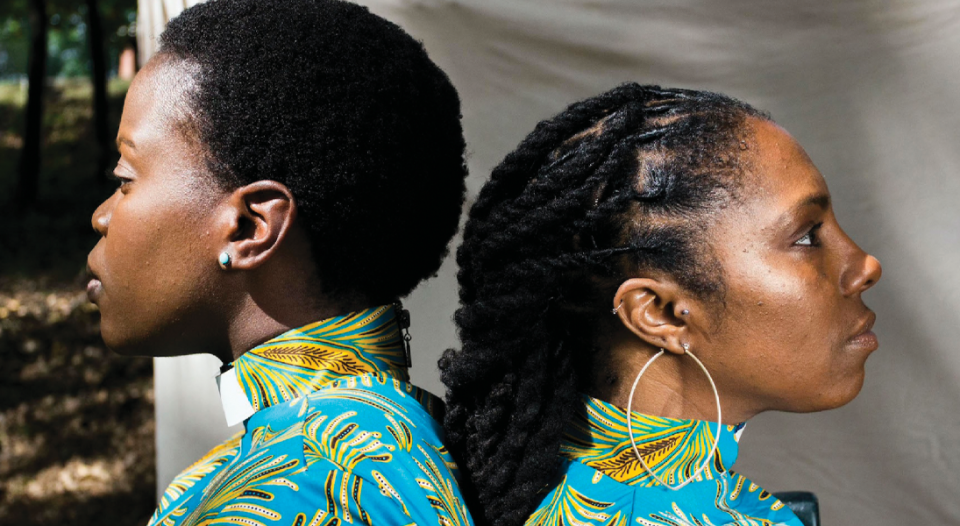Tamika Jancewicz and Laura Kigweba James started the podcast For Collard Girls as a sacred space for women of color in ministry to feel affirmed and cared for. Launched in 2017, the podcast shares the narratives of women of color serving in the church, in the community and in the world.
Jancewicz, a pastor of First Evangelical Lutheran Church in Ellicott City, Md., believes in the sacredness of the stories we choose to share and in the transformative power of biblical storytelling. James is an advocate and the program coordinator for grassroots organizing at the General Board of Church and Society with the United Methodist Church (UMC). Living Lutheran spoke with them about how they approach and create the show.
Living Lutheran: For those who aren’t familiar with For Collard Girls, how do you describe the podcast?
James: For Collard Girls is a sacred encounter. I feel like our shows are that “mm-hmm” moment when words cannot convey the agreement that happens in a good conversation between friends. We are a podcast that amplifies and centers the voices of Black women’s and people of color’s experiences of faith and spirit, life and culture.
A typical episode engages a liturgical practice held with love and care. Our podcast opens with a welcome and a gathering moment for all those listening and participating in the conversation. Then we move into the word, which is the heart of the discussion. We close the discussion portion of the podcast offering peace, which sometimes comes in the form of spiritual practice, a poem or quote from something we have read, or a song that resonates with our spirits. And we always close with gratitude for all who helped the podcast come to life.
How did you decide to start For Collard Girls?
James: The podcast started as a conversation between Tamika, myself and our friends. Around that time, we were all discerning how to engage the church that, in practice, is supposed to be a loving and welcoming space, but so often, as Black women and people of color, leading and being in the church [has] meant that we and our experiences were not cared for or valued.
I served as the first Black woman lead pastor at a church in downtown Baltimore, and Tamika was in seminary and serving a local church. Both of us found ourselves in religious spaces that often felt unsafe and disconnected. We knew that God had called us to lead the church, but we were curious if these were spaces that God was calling us to lead. So then we asked God, “Where do you want us to lead?” That is when For Collard Girls came to be. It is our sacred space where we feel seen, affirmed, cared for, and we hope anyone else who is listening experiences the same.
We asked God, “Where do you want us to lead?”
What have been some of your favorite or most memorable conversations you’ve had on the show?
James: Oh, too many to count. This question is tricky for me, but the most memorable episode was episode one, because it was the first episode we premiered to the public. We also had a launch party, where we gathered so many people in the room to listen and discuss. So the first episode was a manifestation of the community God called us to create together.
Jancewicz: I agree with Laura, the first episode was the most memorable. I’ll also never forget our interview with Tom Hall with [Baltimore public radio station] WYPR. It was our third episode in the first season, and we were so honored to have such an important conversation at the beginning stages of our podcast.
How do you hope listeners experience the podcast?
James: I hope that listeners, especially Black women and women of color in the ministry, take away that your voice and story, just as you share it, is valuable, powerful, worthy, and that the world needs to hear it. So take every moment to share your truth and experience, because the world will be a better place hearing from you.
Jancewicz: I hope our listeners, especially women of color, experience the possibilities in sisterhood and solidarity. Our podcast is about the love we share with one another and the love we have with God. We are better together.
What would you like Lutherans, in particular, to take away from For Collard Girls?
Jancewicz: I hope that Lutherans experience the broadness of what it means to be Lutheran and what it means to be Christian.
Our last season, “Tapestry of Call,” features two Lutheran pastors, the Rev. Nicolette Peñaranda and the Rev. Kelsey Brown, both of whom share their experiences and how they are doing the work their soul must have. To be Lutheran can mean many different things—it’s not just Eurocentric—and we don’t all experience church life and leadership the same.
Also, working alongside one another as an ELCA pastor and UMC pastor shows how it is possible to talk about our faith and learn from one another across denominations. And it’s not about comparing our theological understandings. We discuss real issues in our world together and experience the divine in our differences and in our similarities.
Listen to For Collard Girls here.




